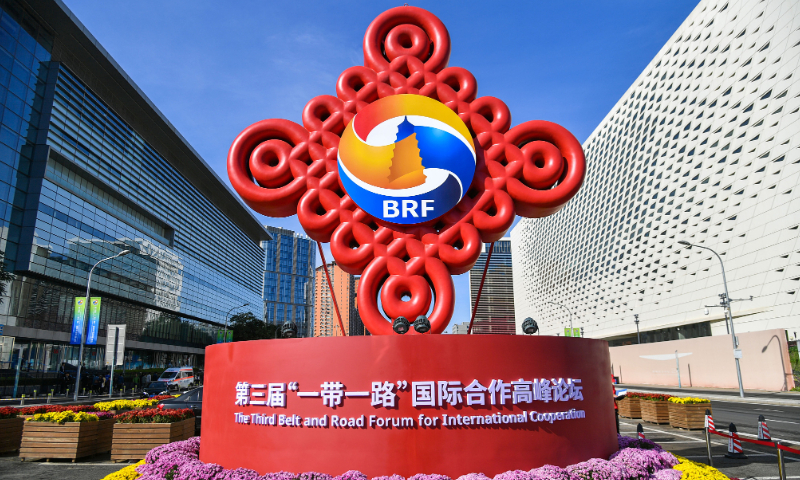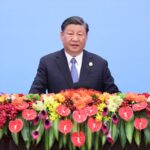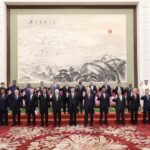The third Belt and Road Forum for International Cooperation (BRF) opened with grandeur on October 18 at the Great Hall of the People in Beijing. President Xi Jinping attended the opening ceremony and delivered a keynote speech titled “Building an Open, Inclusive and Interconnected World For Common Development,” in which he reviewed the original intentions behind the Belt and Road Initiative (BRI) proposed a decade ago and summarized the fruitful achievements and valuable experiences of the past 10 years. Even more uplifting was President Xi’s announcement of the eight major steps China will take to support joint pursuit of high-quality Belt and Road cooperation, signaling a promising decade ahead for the initiative.
These eight steps are in line with the direction of progress of this era and, therefore, possess a high degree of foresight. These specific measures emphasize areas such as digital economy, technological innovation, green development, and livelihood improvement, all of which are the focal points of efforts by countries worldwide. They are closely intertwined with future development. Regarding this highly concerned development issue, some countries have chosen to adopt the approach of “small yard, high fence,” perceiving it as a “winner-takes-all” survival competition. However, China’s eight steps demonstrate a distinctly different path, one that encourages everyone to join hands, support each other, and achieve mutual success, ensuring a brighter future for all.
As President Xi mentioned, the Belt and Road cooperation is based on the belief that flame runs high when everyone adds wood to the fire and that mutual support can get us far. Such cooperation seeks to deliver a good life not only to people of just one country, but to people in other countries as well. It promotes connectivity, mutual benefit, common development, cooperation and win-win outcomes.
This represents an entirely new paradigm that has never existed in the past. The journey of co-building the Belt and Road clearly presents the Chinese approach. Over the past 10 years, Belt and Road cooperation has progressed from “sketching the outline” to “filling in the details,” and blueprints have been turned into real projects. A large number of signature projects and “small yet smart” people-centered programs have been launched. Initially, the international community adopted a cautious stance toward the BRI, but gradually, this has transformed into increasing approval and support. The reason why the BRI has become the largest international public cooperation platform in the world is because it stands on the right side of history. The Chair’s Statement of the third BRF, released on October 18, summarizes the rich achievements of this forum, including China’s support for high-quality Belt and Road cooperation through eight major steps, a list of practical cooperation projects, and the broad consensus reached by representatives from various countries at related forums. It can be foreseen that with more projects being implemented, the foundation of the BRI will be continuously strengthened. More countries and regions will choose to integrate into this historical trend and become partners who cherish the same ideals and follow the same path.
President Xi mentioned in his speech that the Silk Road spirit of peace and cooperation, openness and inclusiveness, mutual learning and mutual benefit is the most important source of strength for Belt and Road cooperation. President Xi also emphasized that ideological confrontation, geopolitical rivalry and bloc politics are not a choice for us and what we stand against are unilateral sanctions, economic coercion and decoupling and supply chain disruption. This Silk Road spirit is not a unilateral proposition by China, but a condensation and refinement by partners through centuries of historical exchanges on the ancient Silk Road. Therefore, it is highly compatible with the BRI participating countries. The reason why the Silk Road spirit has received unanimous welcome and recognition, whether it is from countries in conflict, developing countries, or some developed countries, is obviously not only due to common interests at the practical level, but also due to common pursuits at the value level. It is precisely because of this that the BRI originates from China, and its achievements and opportunities belong to the world.
In the face of a turbulent and changing world, China always represents stability and positive energy, always moving in the right direction of historical progress. UN Secretary-General António Guterres stated at the BRF opening ceremony that with the contributions of the BRI, the world can deliver hope and progress for billions of people and the planet we share. The achievement of the BRF is rare good news for the global economy in crisis. The modernization we are pursuing is not for China alone, we look forward to and is committed to promoting modernization that will enhance peaceful development, mutually beneficial cooperation, and bring prosperity to all. This direction is very clear, and this BRF once again demonstrates this. Therefore, we have more reasons to expect that the BRI, which represents humanity’s joint pursuit of development for all, will write a more magnificent new epic in the next decade.




